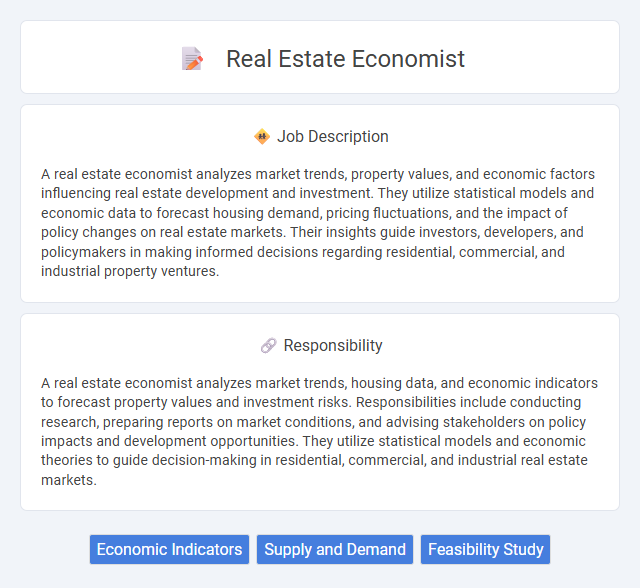
A real estate economist analyzes market trends, property values, and economic factors influencing real estate development and investment. They utilize statistical models and economic data to forecast housing demand, pricing fluctuations, and the impact of policy changes on real estate markets. Their insights guide investors, developers, and policymakers in making informed decisions regarding residential, commercial, and industrial property ventures.
Individuals with strong analytical skills and an interest in market trends are likely suitable for a real estate economist role. People who are comfortable interpreting economic data and forecasting market shifts may find this job aligns well with their strengths. Candidates who prefer solitary work or mathematical modeling could be more compatible with this career path than those seeking predominantly interpersonal roles.
Qualification
A real estate economist typically requires a bachelor's degree in economics, real estate, finance, or a related field, with many employers preferring candidates holding a master's degree or higher. Strong analytical skills, proficiency in data analysis software, and a deep understanding of real estate markets, economic indicators, and financial models are essential qualifications. Experience in market research, econometrics, and forecasting methods enhances the ability to evaluate property values, market trends, and investment risks effectively.
Responsibility
A real estate economist analyzes market trends, housing data, and economic indicators to forecast property values and investment risks. Responsibilities include conducting research, preparing reports on market conditions, and advising stakeholders on policy impacts and development opportunities. They utilize statistical models and economic theories to guide decision-making in residential, commercial, and industrial real estate markets.
Benefit
Real estate economist roles likely offer competitive salaries and the potential for career advancement within the property market analysis sector. Professionals in this job may benefit from developing strong analytical skills and gaining insights into housing trends, which can enhance decision-making for investors and policymakers. The position probably provides opportunities for influencing market strategies and contributing to sustainable urban development.
Challenge
A real estate economist likely faces the challenge of accurately predicting market fluctuations amid volatile economic conditions and rapid urban development. The complexity of integrating diverse data sources and anticipating policy impacts may create considerable uncertainty in forecasting property values and investment trends. Successfully navigating these challenges requires advanced analytical skills and continuous adaptation to emerging market signals.
Career Advancement
Real estate economists analyze market trends, economic data, and policy impacts to forecast property values and support investment decisions. Career advancement often involves moving into senior analyst roles, consulting positions, or leadership roles within real estate firms, financial institutions, or government agencies. Developing expertise in data analytics, urban economics, and gaining advanced degrees like a master's in economics or real estate finance significantly enhances promotion prospects.
Key Terms
Economic Indicators
Real estate economists analyze key economic indicators such as interest rates, housing starts, employment data, and inflation to forecast market trends and guide investment decisions. They interpret data on mortgage rates, consumer confidence, and GDP growth to assess the health of the real estate sector. Their insights help developers, investors, and policymakers anticipate market shifts and optimize property valuations.
Supply and Demand
Real estate economists analyze market trends by examining the interplay of supply and demand to forecast property values and investment potential. They evaluate factors such as housing inventory, construction rates, and buyer demographics to determine market equilibrium and predict shifts in pricing. Their insights guide developers, investors, and policymakers in making informed decisions about real estate development and resource allocation.
Feasibility Study
A real estate economist specializing in feasibility studies analyzes market trends, financial projections, and regulatory environments to determine the viability of property developments. They assess supply and demand dynamics, conduct risk assessments, and prepare detailed reports to guide investment decisions. Their insights help stakeholders minimize financial risks and optimize returns on real estate projects.
 kuljobs.com
kuljobs.com